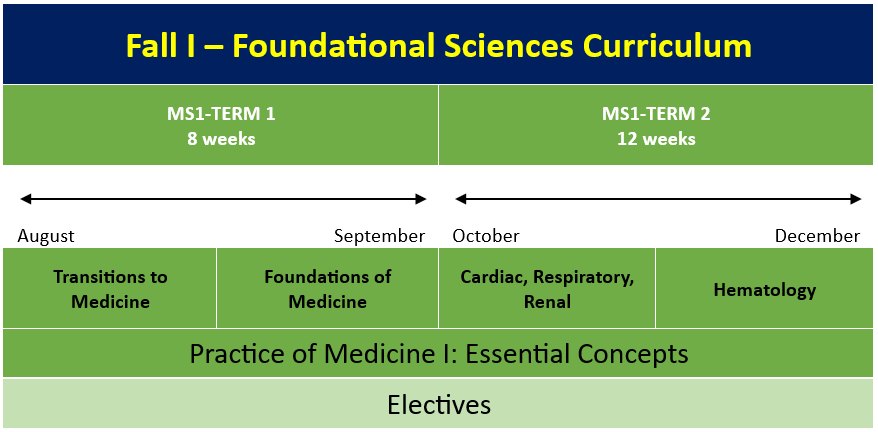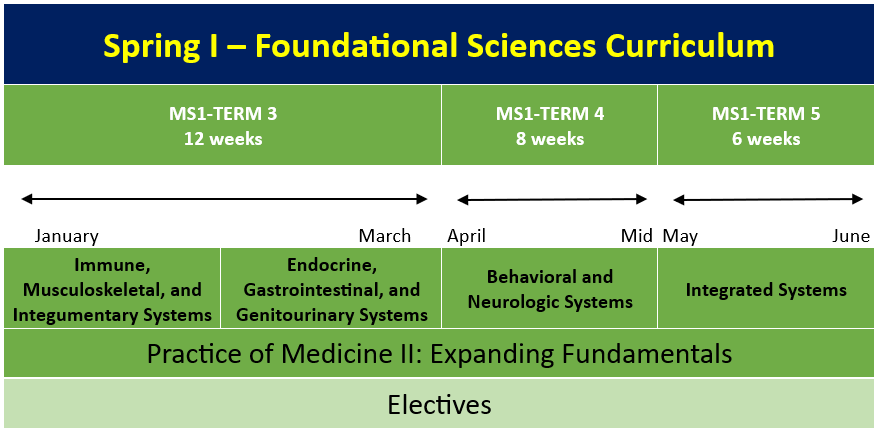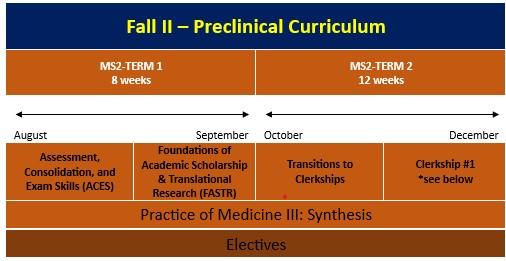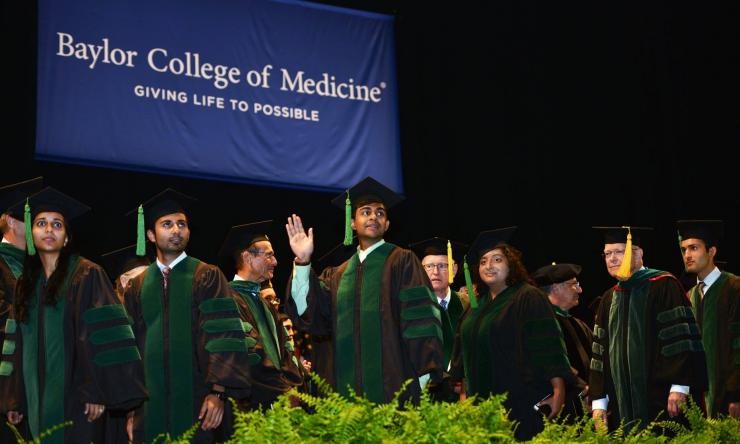For graduating class of 2027 and beyond
The 15-month Foundational Science curriculum includes early, one-on-one patient contact, state-of-the-art technological resources, and small group learning settings.
With our integrated approach, students first learn the core scientific concepts that underlie medicine and apply these to the body's organ systems in their healthy state and pathologic state.
Early introduction to seeing patients provides meaning and context as students gain the foundational knowledge required to practice medicine. Students continue to have opportunities to grow and enhance their understanding of scientific concepts throughout their clinical training.
The foundational sciences curriculum is divided into three phases that extend from August of the first year through October of the second year.
Year 1- Fall

MS1 Term 1 introduces students to the core basic sciences that provide the foundations for the practice of medicine. This begins with the Transitions to Medicine course, which runs for the first three weeks. This is followed by the Foundations of Medicine course for the next five weeks.
MS1 Term 2 begins a series of courses covering related organ systems, while reinforcing concepts learned previously. The first of these is the Cardiac, Respiratory, and Renal course, which takes place over eight weeks from September to November. This is followed by the Hematology course over three weeks and ends in December.
Finally, the Practice of Medicine I (POM I) course spans Terms 1 and 2 and provides students with essential concepts to developing clinical skills.
Year 1- Spring

MS1 Terms 3, 4 and 5 occur from January to June and are divided into three successive teaching terms. Term 3 begins with the Immune, Musculoskeletal, and Integumentary Systems Course, followed by the Endocrine, Gastrointestinal, and Genitourinary Systems course. Each course is five to six weeks long and runs from January to March.
Term 4 is April and May and features the Behavioral and Neurologic Systems course, which is six weeks long.
Term 5 concludes the first year of the Foundational Curriculum with the Integrated Systems course. This five-week course delves deeper into Infectious Disease and how it affects the body as a whole.
The Practice of Medicine II (POM II) course occurs during Terms 3, 4, and 5, and expands upon the fundamentals that have been learned in POM I.
Year 2 - Fall
MS2 Terms 1 and 2 encompasses the period between August and October of the second year and consists of courses designed to consolidate the foundational year, and to prepare students for rotations.
MS2 Term 1 runs for eight weeks from August to September. In the first four weeks, students will prepare for the CBSE exam in the Assessment, Consolidation, and Exam Skills (ACES) course. This is followed by the four-week Foundations of Academic Scholarship and Translational Research (FASTR) course, which will give students the tools they need to complete their required scholarly project. The final Practice of Medicine III (POM III) course will occur during Term 1 and will synthesize all previously learned concepts.
MS2 Term 2 begins with the four-week Transitions to Clerkships (TTC) course, followed by the first core clerkship beginning at the end of October.
Electives
Electives provide students the opportunity to explore areas of interest to them and learn more about specialties they are considering pursuing. Baylor College of Medicine offers over 350 elective courses, ensuring that every student can find ones that match their passions.
During the Foundational Sciences curriculum students are allowed to apply for electives for credit as outlined in the Graduation Requirements. These, as well as the rules governing electives, are all listed in the Electives Catalog.
"Adjusting to the workload in medical school is difficult where ever you go. Having the support of my Peer Resource Network, particularly the second years who shared how hard it was for them, made the transition much easier. My PRN and my mentors have helped me every step of the way. The faculty is also really helpful in providing strategies to help us master specific parts of the curriculum."
Leveraging Technology to Enhance Learning
The Anatomage table and software enhance the anatomy learning process at Baylor College of Medicine.
Graduation Requirements
View Requirements for the Degree of Doctor of Medicine and Core Competency Graduation Goals.
"I clearly saw how people's different perspectives really influenced how they initially looked at a case. Having people in the room who have had diverse experiences allowed me to gain a better view and be open to more perspectives."
Progress Notes
Wondering what medical school is really like? Follow our students on Progress Notes for first-hand perspective on the experience.










